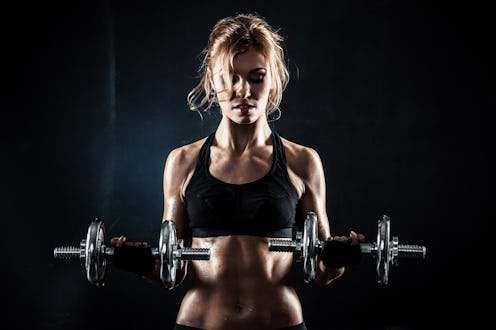
Quick: What's the first thing that comes to mind when someone says weight lifting? Seriously jacked up bodies? Intimidatingly heavy looking dumbbells? Chest-bumping bros? If any of those mental images have scared you away from the weight room, you're missing out. Because as great as cardio is, weight training is the perfect complement to your hours on the elliptical — and, sometimes, it's even better for your body.
But staring at a rack of weights with no idea where (or why) to start is a waste of your gym time. So, before your next sweat sesh, get schooled in strength training. We tapped Erica Giovinazzo, a CrossFit Coach at Brick New York and a registered dietitian with her master's from New York University, to answer all your weight lifting questions. If she can't convince you, we don't know what will.
Why should I lift weights?
Duh — it builds muscle. But there's more to that than just a buff body. "Increasing muscle is important, because it also increases your metabolism, which means that you burn more calories in a day. That's what you want to hear, right?" says Giovinazzo. "And resistance training helps increase bone density, which helps to prevent osteoporosis." Then there are the less physical elements: who doesn't want to feel stronger (no need for help lifting your luggage or opening that stubborn jar of almond butter) — or more confident? "When a woman I'm training lifts a heavier weight than she ever thought possible, it is perhaps one of the most empowering feelings she will have in her life. Imagine that on a repeated basis!" she adds.
Does lifting have to mean bulking up?
This is one of the biggest fitness myths out there. "Women aren't biologically designed to have big bulky muscles," explains Giovinazzo. "If you feel like you 'get bulky' when you lift weight, it's likely because you are eating too much. Women with big muscles work very hard to 'get big' by eating a lot and following a very specific exercise program." For you, lifting means stronger muscles, which means a more toned look over all. "I always tell women who are afraid about this, just try it. If you don't like it, a trainer can help you change up your workout. No woman has ever come to me while training with me and said they were getting too bulky. Actually, more woman who are not my clients come to me and say, 'I want to look like that!'"
What's the right technique for lifting?
"It is so important to see a trainer who knows about lifting so they can teach you the correct movement pattern," says Giovinazzo. "That being said, some of the key things to remember are to keep a neutral spine — this means to keep your back flat as well as your neck, so your whole spine is in one straight line — keep your core tight, and keep your shoulder blades back. If something hurts ... stop!"
What kind of weights should I start with?
Obviously, there's no one answer — it all depends on your personal strength. "What's most important is that you start with weights that you can lift without too much strain and have good form. Technique precedes weight," explains Giovinazzo. "Most of my new women start with just the women's barbell (35 pounds) or the training bar (22 pounds)."
Olympic 7-Foot Chrome Barbell, $61.99, Amazon
Olympic 5-Foot Chrome Barbell, $37, Amazon
How many reps do I do?
Like with most workouts, variety is the name of the game. "Switch it up!" says Giovinazzo. "Sometimes, do five sets of five reps, other times, three sets of ten. For the purposes of general exercise, it's not really so important to figure out what your "one rep max" is (the heaviest weight you can lift)."
When do I add more weight?
"The last set that you should do shouldn't be easy," says Giovinazzo. "If it's easy, then the next time you do that lift, increase the weight by five to ten pounds. If you complete your sets and reps, then increase the weight next time. One of my favorite quotes is, 'If it doesn't challenge you, it doesn't change you.' If you increase the weight by five pounds every week, you will see some big gains in strength." But don't forget technique — if you're struggling so much that you lose your form, take the weight down a notch.
How long should I lift for?
"A typical lifting session will last about 30 minutes for general fitness," suggests Giovinazzo. "Pick one or two lifts — bicep curls or dead lifts or whatever — to focus on per training session." Add that to your cardio, and you've got a solid workout plan.
Should I lift every time I'm at the gym?
No matter what you're doing to work out, it's important to take time off to let your body recover. "One of my coach's quotes is, 'Train hard. Recover harder.' It's important to work hard in the gym. But when you do that, the muscles get broken down. When you sleep and take a rest day, it allows the muscles a chance to rebuild themselves, which is what makes them stronger," explains Giovinazzo. "If we constantly beat our muscles up, it's possible to get injured, to not get the results you want, and to feel like your energy is depleted." And that defeats the whole purpose of working hard — so here's your free pass for a cheat day. Five more pounds tomorrow!
Image: Maksim Toome/Fotolia